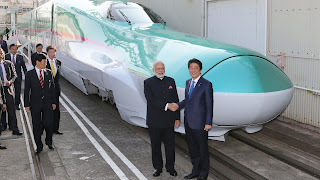FREE Legal advice service Help! We offer a comprehensive legal advice and opinion service covering all aspects of Indian law: Email a legal question. WE DO NOT ASK ANY INFORMATION FROM USERS
Monday, January 31, 2022
Bullet Train: Supreme Court sets aside Delhi High Court order to consider infra firm's bid for depot construction
Sunday, January 30, 2022
Bombay High Court Refuses To Stall Release Of Web Series "Mission to Pakistan"
The court was hearing an interim application in a commercial suit by Solflicks Filmworks Pvt Ltd (SFPL) against Zee Entertainment Enterprises Ltd (ZEEL) seeking to restrain ZEEL from acting in pursuance to the termination letters, by which the Production Agreement was purported to be terminated. The application also sought restrain on ZEEL from entering into an agreement with any third party and from utilising any intellectual property rights 'belonging to SFPL' with respect to the series.
The Case
ZEEL cleared the screenplay on March 7, 2021 and proceeded with the next stage which involved getting dialogues written and providing a shoot timeline with regards to commencement of shoot from March 20, 2021. However, on June 16, 2021, ZEEL proceeded to terminate the production agreement citing a clause which talked about "creative differences/discontent warranting termination of the contract".
Court Order
The court further added, "It is trite that in a work executed pursuant to such commissioning, in the absence of any agreement to the contrary, the person creating the work does not hold a copyright as the ownership of the copyright vests in the person getting the work commissioned." The court also rejected the argument about "unequal bargaining power".
Thursday, January 27, 2022
The man who suffered permanent disability to sexual organs in road accident, Karnataka High Court orders ₹17.68 lakh compensation
Referring to a judgement of the Supreme Court in
Rekha Jain v. National Insurance Company, the Court noted that the human rights angle must be taken into account.
"Possession of one's own body is the first and most valuable of all human rights and bodily injury should be equated with deprivation of basic human rights which entitles compensation depending upon the gravity of the injury,"
Multiplier has to be determined based on completed age, not running age -Motor accident cases (Kerala High Court)
Wednesday, January 26, 2022
Leniency can't be shown to driver merely because accident was minor and not fatal: Supreme Court
A Division Bench of Justices MR Shah and BV Nagarathna observed that driving a vehicle under the influence of alcohol is not only a misconduct but also an offence.
"Merely because there was no major loss and it was a minor accident cannot be a ground to show leniency. It was sheer good luck that the accident was not a fatal accident. It could have been a fatal accident," the Court said.
Such an act of driving a vehicle under the influence of alcohol and playing with the lives of the others is a very serious misconduct, the Division Bench added.
The Court was hearing an appeal moved by one Brijesh Chandra Dwivedi (through his legal representatives) against an order of the Allahabad High Court that had upheld his dismissal from service after being found guilty of driving under the influence of alcohol due to which an accident took place.
Dwivedi was a driver posted at the 12th Battalion, Provincial Armed Constabulary (PAC) at Fatehpur.
While he was on duty driving a truck carrying PAC personnel from Fatehpur to Allahabad, it was involved in a motor accident.
He was charged for having caused the accident by dashing his truck on the back of the jeep while driving under the influence of alcohol.
At the outset, the top court has observed that driving a truck carrying the PAC personnel under the influence of alcohol is a very serious misconduct and such an indiscipline cannot be tolerated, particularly in military.
The employee-appellant argued that since it was a minor accident, which resulted in some loss to the vehicle and considering his 25-year-long service, the order of dismissal was disproportionate to the misconduct proved.
The respondent, however, argued that the punishment for dismissal was not disproportionate since the accused had also been a habitual consumer of alcohol.
The Bench clarified that merely because the accident that took place was a minor one, cannot be a ground to show leniency on the employee.
The Court was of the view that it was only sheer good luck of the PAC personnel that the accident was not a fatal one.
"When the employee was driving a truck carrying the P.A.C. personnel, the lives of those PAC personnel who were travelling in the truck were in the hands of the driver. Therefore, it can be said that he (referring to appellant) played with the lives of those PAC personnel, who were on duty and travelling from Fatehpur to Allahabad on Kumbh Mela duty," the Bench noted.
However, the Court took into account the statement by the appellant that he had not consumed liquor before driving the vehicle but did so after the accident had taken place to suppress fear.
Though the statement has not been accepted, it could be plausible, the Court opined.
In view of the same and taking into account his long service, the Court said that the punishment of dismissal might be too harsh and converted the same to one of compulsory retirement.
"...the award of punishment of dismissal can be said to be too harsh, the punishment of dismissal is directed to be converted into compulsory retirement of the employee. As the employee has since died, and on converting the punishment of dismissal to that of compulsory retirement, death-cum-retirement benefits as also the benefit of family pension, if any, shall be paid to the legal heirs of the deceased employee in accordance with law and bearing in mind that punishment of dismissal has now been converted into one of compulsory retirement," the judgment said.
Monday, January 24, 2022
Family Courts cannot dispose of matters at cost of sacrificing cause of justice: Delhi High Court
Read Order
"We are dismayed at the approach adopted by Ms. Anju Bajaj Chandna, Principal Judge, Family Court, New Delhi District, Patiala House Courts, New Delhi. The endeavour of the Court cannot be simply to dispose of matters, one way or another at the cost of sacrificing the cause of justice. The Family Courts are expected to function so as to bring about a settlement, if possible. Since the parties, themselves, were seeking an adjournment on account of them being in negotiation, there was no justification for the Family Court to have declined the request for adjournment made before it; to have closed the right of the appellant to lead evidence and; to proceed to judgment dismissing the divorce petition. The impugned order reflects very poorly in the manner in which the Family Court has conducted itself."
The Court was hearing an appeal against a family court order in a divorce petition preferred by a husband under Section 13(1)(ia) of the Hindu Marriage Act.
The High Court thus set aside the order and referred the parties for mediation, at their request.
ICAI to frame policy mandating Chartered Accountants to disclose criminal cases against them -Delhi High Court
“ICAI shall accordingly frame a policy and a mechanism, if not already in existence, for disclosure by members both at the inception as also on a periodic basis thereafter, of any criminal cases or convictions so that the spirit and intent of the statute is given effect to and the ICAI is not in the dark about the same until it is notified by some information or complaint,” the single-judge ruled.
The Court was dealing with a petition filed by a chartered accountant (CA), Mohit Bansal, challenging the show-cause notice issued to him under Section 8(v) of the Chartered Accountants Act, regarding his conviction for assaulting a woman in 2001.
Section 8(v) deals with offences involving ‘moral turpitude’ and stipulates that if a person is convicted of such an act, their name can be barred from being entered or borne in the register of the ICAI.
It was argued that though he was first convicted of gang-rape but, in February 2010, the High Court had reduced it to assault.
However, this fact was kept hidden from the ICAI for all these years and a show-cause notice was only issued in June 2018, allowing him to keep his practice for over a decade.
Justice Singh held that there are certain professions and services which require a very high standard of integrity and are considered ‘noble', and being a CA falls in that category.
The Court, therefore, upheld the show-cause notice, observing that the petitioner's case is covered under Section 8(v) of the CA Act.
“The Petitioner, in this case, having been convicted for offences under Section 354 and 506-II of IPC, is clearly attracted by the disability under Section 8(v) of the Act. He has already practised for almost 12 years by the time the notice was issued by ICAI. Ideally, ICAI ought to have had adequate checks at the time of registration itself. However, the fact that the conviction of the Petitioner may have not come to the attention of the ICAI for more than 10 years would not, in any manner, bar ICAI from taking action, especially, when the offence involved is one of such a grave and serious nature,” the Court said.
Sunday, January 23, 2022
"Complainant 27 years old, relationship prima facie consensual:" Karnataka High Court grants bail to rape accused
The Karnataka High Court recently granted bail in a rape case after observing that the relationship between the accused and the complainant appeared to be consensual prima facie [Manoj Kumar M R v. the State of Karnataka and Ors].
Justice Sreenivas Harish Kumar granted bail to the appellant-accused, who allegedly raped the woman but did not marry her as she belongs to a particular caste, and then tried to strangulate her.
The Court noted that as the woman is 27 years old and it appeared they got their second pregnancy terminated voluntarily, she knew the consequences of having a sexual relationship with the appellant.
"The age of the second respondent is 27 years. She knew the consequences of having intercourse with the appellant.....It is difficult to arrive at a conclusion at this stage that the appellant used to have sexual intercourse with the second respondent forcibly," the Court observed.
The Court in disposing of the petition stated:
" ... it is not difficult to arrive at a conclusion that the appellant has been able to make out a case for grant of bail. The Special Court ought to have considered these aspects of the matter at the time of deciding the application for bail. It appears that very routinely the Court below has come to conclusion for denying the appellant's application for bail."
Thursday, January 20, 2022
Daughter is entitled to Self-acquired property of Hindu male deceased before Hindu Succession Act devolves by inheritance -SC
The Court framed the following questions for consideration:
1) What is the nature of the property and what would be the course of succession if it is a separate property as opposed to the undivided property?
2) Whether a sole daughter could inherit her father’s separate property dying intestate?
3) If the answer to 2 is 'yes', what would be the order of succession after the death of such a daughter?
"One school is of the view that such a daughter inherits a limited estate like a widow, and after her death would revert back to the heirs of the deceased male who would be entitled to inherit by survivorship. While other school of thought holds the opposite view," the Court noted.
"The main scheme of this Act is to establish complete equality between male and female with regard to property rights and the rights of the female were declared absolute, completely abolishing all notions of a limited estate. The Act brought about changes in the law of succession among Hindus and gave rights which were till then unknown in relation to women’s property," the Court noted.
In the present case, the since the succession of the suit properties opened in 1967 upon death of Kupayee Ammal, the 1956 Act shall apply and thereby Ramasamy Gounder’s daughters being Class-I heirs of their father too shall be heirs and entitled to 1/5th share each in the suit properties, the Court ruled.
Wednesday, January 19, 2022
Only sports persons can be office bearers in sports associations; mandates online registration for sports meets-Madras High Court
The single judge in his order said that these measures would "go a long way in ensuring that the best talent in the country is sent for participation in every event that matters up to the level of Olympics and that deserving candidates are never left out of the fray."
Pertinently, the Court directed that important functionaries in such organisations would only be sportspersons, and no one would be given an important post only on the ground of financial contributions.
This order came on a petition by an athlete seeking an online registration system, claiming that in spite of her stellar performance, she was denied entry by the Tamil Nadu Athletics Association to participate in the Open National Championships for the years 2017 and 2018.
The petitioner submitted that the respondents adopt a pick-and-choose method to select athletes, while ignoring well-merited athletes like her.
In fact, it was the petitioner’s contention that there was a dire need to implement the Sports Code to revamp the State and District level sports bodies and retrieve them from “the clutches of politicians or businessmen”.
On hearing the petitioner’s submissions the Court observed that “the disease is not just on the externally visible layers of the system, but has penetrated deep into every layer trickling down up to the lowest level of decision-making.”
Therefore, the single-Judge deemed it essential that every representative body responsible in any way for the selection of athletes is made accountable by the State for their actions and financial aid received by them.
It was emphasised that only external changes without solving real problems such as ignorance of merit, issues of favouritism and nepotism would be pointless.
“This reminds one of the analogy that taking a superfluous view on the matter by only making external changes without looking into the problems, which are the real reasons for such ignorance of merit, and the issues of favouritism and nepotism, in the system of selection of athletes, would be like using the skills of dermatology to cure the deep-rooted cells of cancer,” the Court said.
Wife entitled to maintenance from husband even if she lives in matrimonial home: Delhi Court
The Court further underscored that in Indian society, an educated woman may not be allowed to have a regular job as she has to attend to the needs of her matrimonial home.
“It is unbelievable that her husband is not paying her any maintenance or not taking care of her necessities," Additional Sessions Judge Monika Saroha noted.
The Court was acting on an appeal against an order of the trial court that had dismissed the plea of a woman seeking interim maintenance from her estranged husband.
The woman had filed a complaint under Section 12 of the Protection of Women from Domestic Violence Act (DV Act), alleging torture by her husband. After the husband denied the allegations, the trial court had found no ground for granting interim maintenance, noting that the woman had Master’s and Bachelor’s degrees, and was capable of maintaining herself.
On this point, the Court in the instant appeal observed:
“A middle-aged woman, a mother of three, who has accused her husband and in-law of threatening her with domestic violence, can not be denied maintenance on the ground that many years ago she had procured a BA and B.Ed degree.”
Insurance company liable to pay claim even if vehicle stolen and unauthorisedly driven: Delhi High Court
The order was passed on a plea by United Insurance (appellant) challenging the order of tribunal granting recovery rights against the driver of the vehicle.
The insurance company had argued that the vehicle was stolen and was being driven by a professional thief and, therefore, there was no liability on the insurance company to pay the amount.
However, the tribunal had found that though the vehicle was stolen by one Niraj alias Mika, a complaint had already been lodged with Police Station Narela with regard to the offending vehicle.
Therefore, the question before the Court was whether the insurance company is absolved of the liability to pay the amount in a case where the vehicle was stolen and was unauthorizedly being driven by somebody else.
It relied on the Supreme Court judgment in United India Insurance Company vs. Lehru and Ors to hold that the insurance company had failed to show any willful breach on the part of insured.
Justice Sachdeva also disagreed with the Madras High Court order which was relied upon by the counsel for the appellant. The Court said that the Madras High Court had not considered the apex court's judgement in Lehru.
"I am in respectful disagreement with the said judgment of the Madras High Court in New India Assurance Co Ltd vs. Selvarajamani & Ors, 1998 ACJ 547 relied on by learned counsel appearing for the appellant. Said judgment does not consider the proposition as laid down by the Supreme Court in Lehru (supra) as to whether there is a willful breach on the part of the insured or not so as to entitle the insurer to avoid the liability," the High Court said.
The Court, therefore, held that there was no infirmity in the tribunal's order and dismissed the appeals.
Monday, January 17, 2022
CCTV must be installed in Every police station- Supreme Court
Despite the order of the Supreme Court Why don't governments bring police stations under the ambit of CCTV?
http://www.swamilawyer.com/2022/01/despite-order-of-supreme-court-why-dont.html












